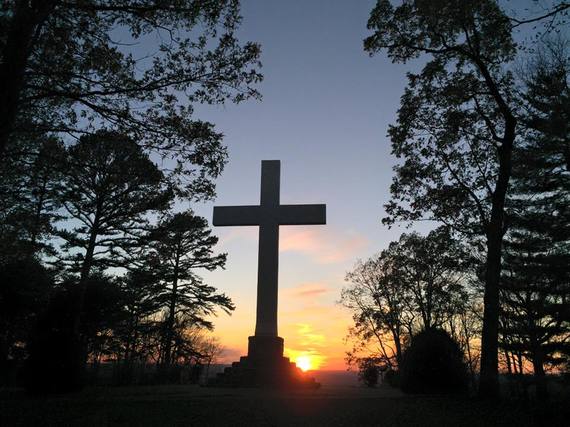
Source: Karl Ulbrich
The image of an infant lying in a manger evokes warm feelings of God's loving presence in our midst, but it carries cosmic implications that provide insight into how to face today's challenge of climate change. These implications have to do with the "us" in Emmanuel ("God with us"), the name given to the Messiah by Isaiah and Matthew.
CREATION AND CREATOR
In the Bible there are two fundamental orders of reality: the Creator and the creation. There's God and everything else, which includes us humans. So, when John says "...the Word became flesh and lived among us" he is saying that the second person of the Trinity became part of the created order. God joined Godself not only to humans, but to all things, bridging the gap between the Creator and the created. John 3:16 (a passage plastered on signs scattered throughout the countryside, at least where I live) further states
For God so loved the world that he gave his only Son, so that everyone who believes in him may not perish but may have eternal life.
The word we translate "world" here in the Greek is Κóσμος, "cosmos" or "beauty." This word connotes divine order, integrity, wholeness, and moral rectitude. Thus, Jonathan Edwards says that, "a thing appears beautiful when viewed most perfectly comprehensively and universally, with regards to all its tendencies, and its connections with everything it stands related to." Thus, God "gave his only Son" because God loves its order and beauty. God loves everything God has made - every grain of sand, fly, lion, fish and tree - and all the ecological relationships that hold everything together. God delights in it all so much that God chose to become one with it, infusing it with God's presence. Just as Christians believe that God dwells in us, so God dwells in all things. This is why we can encounter God in the ordinary.
THE COSMOS AND ETERNAL LIFE
If God loves the cosmos so much, why does John say that as a result God wants humans to have eternal life? I think there are three things to consider. First, when we have God living in us, we possess eternal life, Life itself. As Jesus said, I am the Way, the Truth, and the Life. When we go to heaven, we experience the fullness of the life we have begun here. Second, when God made humans, we were made in the image of God, meaning we were intended to mirror or reflect God's presence to all things. In the same way Jesus images to us the invisible Father. So, Jesus makes visible the invisible God to us, and by Jesus' spirit living in us, we thereby reveal Jesus to all of creation. Finally, I think that God chose to become human for creation's sake because, not only have we humans too often failed to reflect God's love and delight to nonhuman creation, we have been destroying it. We of all creatures have the greatest capacity to change the world around us for good or ill. So, it's crucial to God that we do so in ways reflecting God's delight and care.
FACING CLIMATE CHANGE
This has direct implications for the way we view climate change. First, God loves all the processes of creation, including climatic processes, as well as all creatures, living and nonliving. If we love God, we should too. The state of the world should give us great pause if we claim to love God.
Second, the solution to climate change and all the problems that flow from it therefore lies in allowing God's life to work in and through us. So, if we truly believe God is with us and is active in this world, we need to allow God to transform us so that we mirror God's presence by doing those things that bring life and healing instead of destruction. This implies that we need to listen to God, to hear what God wants each of us to do. As Proverbs 3: 5&6 admonishes us,
Trust in the Lord with all your heart,
and do not rely on your own insight.
In all your ways acknowledge him,
and he will make straight your paths.
We also have assurance that God will guide us:
And when your turn to the right
or when you turn to the left,
your ears shall hear a word behind you, saying
"This is the way; walk in it." (Isaiah 30: 21)
The danger in facing a challenge as great and imminent as climate change is that in our panic we will fall prey to the very temptations that have led us to the situation we find ourselves in. By thinking that we know what needs to be done, we put ourselves in the driver seat and fall prey to the sin of pride. The Quakers say that the most important thing we can do is to sit still. Lots of frantic action might seem productive and necessary - but the result may resemble more closely a chaotic scene from a Keystone Cops movie than a concerted, effective approach to solving a truly complex problem. We need wisdom and insight greater than ours. When we follow God's prompting, obeying the "still, small voice", we will do those things that truly contribute to an effective solution. It's a matter of an active faith, of trust. And that's what we're called to every day of our lives.
Reference on beauty: John Gatta, Making Nature Sacred: Literature, Religion, and Environment in America from the Puritans to the Present (New York: Oxford University Press, 2004), 70 &90.
